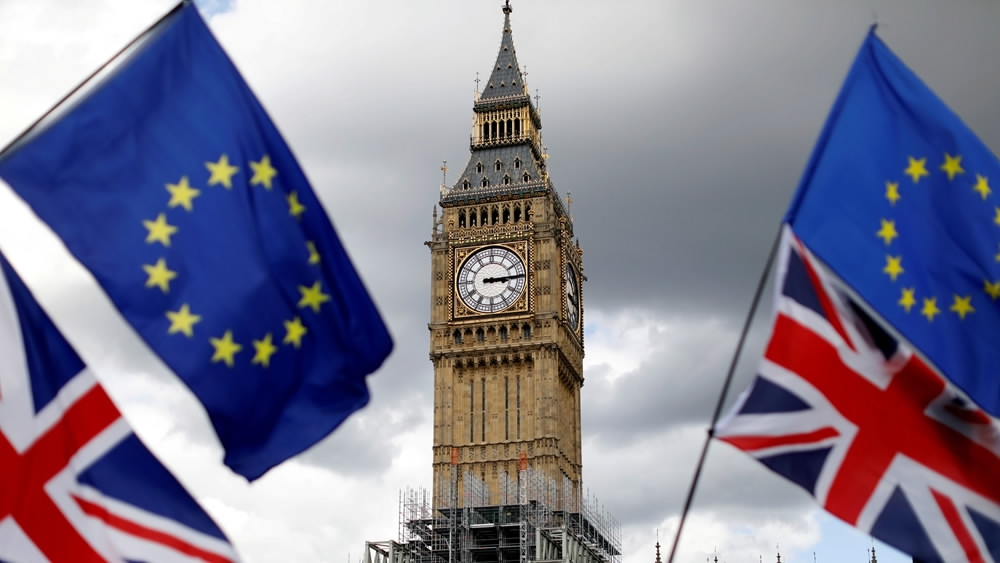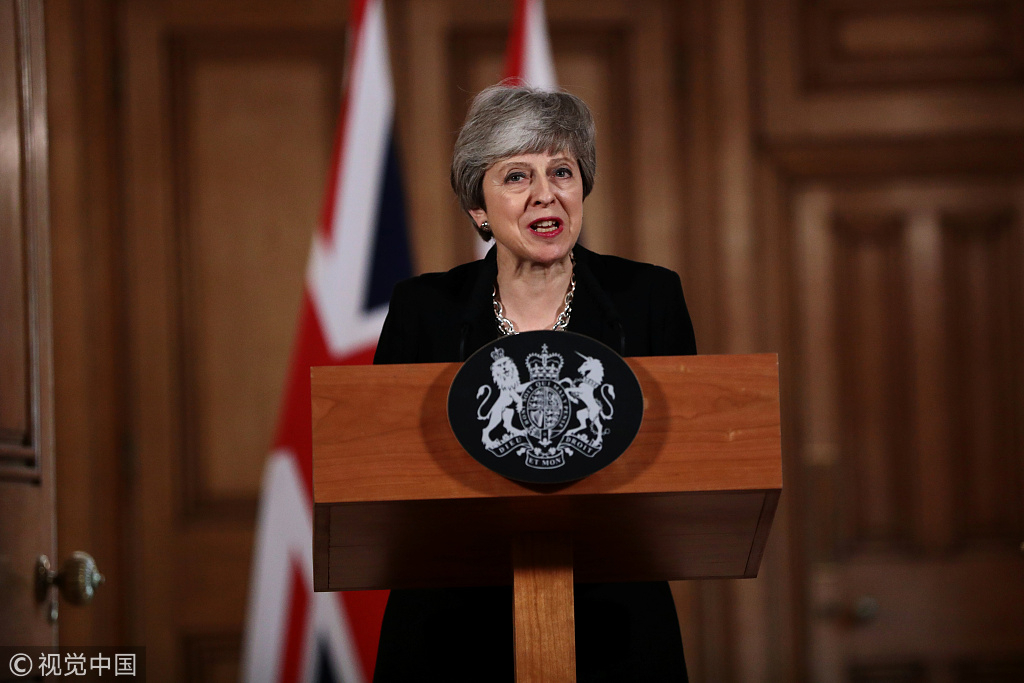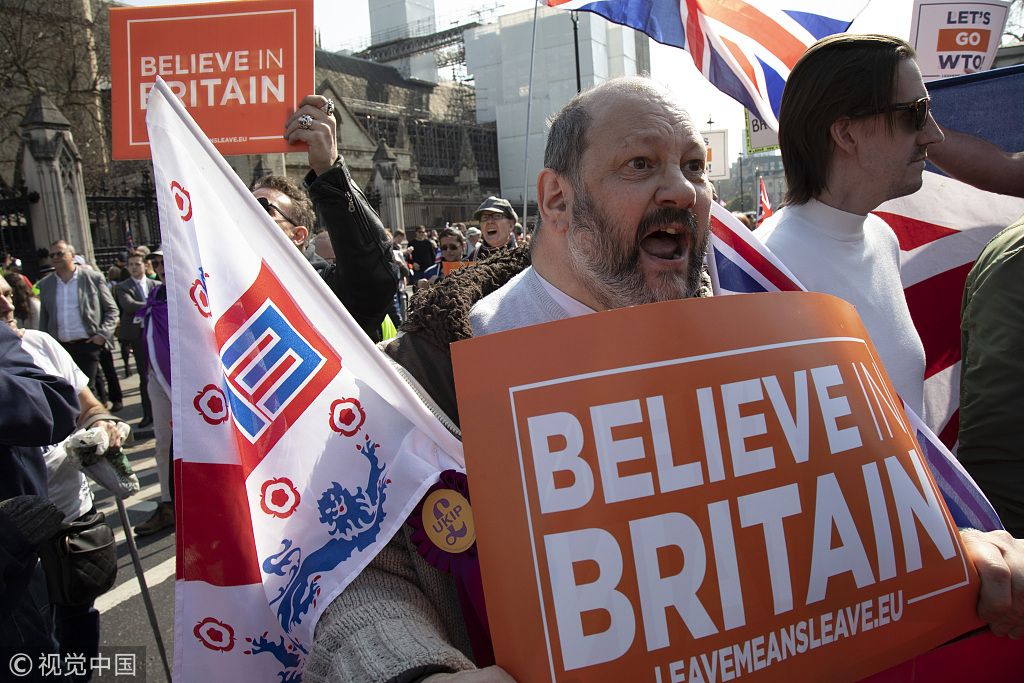
Opinion
17:00, 20-Apr-2019
New Brexit Party makes Britain's Brexit less likely
Thom Brooks

Editor's note: Thom Brooks is the dean of Durham Law School and a professor of Law and Government at Durham University. The article reflects the author's opinions, and not necessarily the views of CGTN.
The UK Parliament has rejected Prime Minister Theresa May's Brexit deal with the EU an unprecedented three times this year. The lack of a deal and deep concerns about the economic damage leaving the EU without a deal would have for the UK has started to turn the tide against support for Brexit. Polls show 59 percent of the public is now for staying in the EU.
The political stalemate in Parliament has far-reaching consequences. One of them is that the UK did not begin to leave the EU in March and must participate in elections to the European Parliament.
This is expected to be very damaging to May's Conservative Party for their failure to deliver Brexit. It also puts the UK in an awkward position of trying to negotiate to leave the EU while taking part in elections to shape the EU's future.

British Prime Minister Theresa May gives a news conference after a cabinet meeting, outside Downing Street, London, Britain, April 2, 2019. /VCG Photo
British Prime Minister Theresa May gives a news conference after a cabinet meeting, outside Downing Street, London, Britain, April 2, 2019. /VCG Photo
The changing political landscape has produced two new parties. The first is Change UK, a group of MPs who defected from Labour and the Conservatives. They started off poorly, changing their original name from the lackluster The Independent Group only recently. The MPs are united in their commitment to staying in the EU, but seem divided on about everything else. They are not expected to do especially well at this point in the EU Parliament's elections.
However, the second new party – the Brexit Party – is in a very different position. The Brexit Party is also a mostly one-issue party as its name implies, but it is headed by Nigel Farage. As former UK Independence Party (UKIP) leader, Farage never found success in winning seats in the UK's Parliament but his party came out top in the last elections for the EU's Parliament. He's arguably the best-known Brexiteer in Britain, and was once called "Mr. Brexit" by U.S. President Donald Trump.
The polls show strong support for the Brexit Party ahead of the EU elections, but still, less than a third of the public supports them. This will likely change once its candidates are made known. No doubt the Brexit Party is driven by a view that Westminster has betrayed the EU Referendum result and so a new party is needed to make Brexit a reality.
The irony is that the Brexit Party makes Britain's Brexit less likely.
One reason is it carves up public support for Brexit between the Tories, UKIP and themselves. It will make it more difficult for pro-Brexit candidates to win because more will be contesting the same seat. While Greens and Liberal Democrats have supported Remaining, Labour looks set to come out best with strongly pro-Remain supporters who lack an established, known alternative to turn to.
A second reason is that even if the Brexit Party performs well in the EU Parliament, this will do nothing to help get any Brexit deal through Parliament. New parties face serious challenges in Britain's first-past-the-post system. After seven attempts at becoming an MP since 1994, Farage never managed it. He's no more popular now than then and if he can't manage to win, other less well-known candidates in his Brexit Party will do even worse.

Leave supporters gather in Parliament Square to protest against Brexit delay, on the day the UK had been due to leave the EU on March 29, 2019. /VCG Photo
Leave supporters gather in Parliament Square to protest against Brexit delay, on the day the UK had been due to leave the EU on March 29, 2019. /VCG Photo
Finally, what the Brexit Party will do if contesting elections for the UK's Parliament is continue to hurt the Tories. The UK only had a referendum in the first place because then Prime Minister David Cameron feared the Tories could not win a majority in Parliament if they did not stop losing votes to Farage's UKIP. Cameron promised a referendum to do this and it worked: UKIP was stopped and Cameron won a working majority.
The failure of Cameron's successor Theresa May to win support for her deal gives new life to the threat of UKIP voters taking support away from the Tories. Farage's new Brexit Party will make it worse for the Tories, but the likely result is neither will win seats – and the less seats they win, the less likely there is Brexit.
We should not forget Farage last quit as UKIP leader within hours of the Brexit vote. He has never been in a position to deliver on his promises. If my analysis is correct, then this will continue – and so too the UK's membership within the EU thanks to Farage's Brexit Party.
(If you want to contribute and have specific expertise, please contact us at opinions@cgtn.com.)

SITEMAP
Copyright © 2018 CGTN. Beijing ICP prepared NO.16065310-3
Copyright © 2018 CGTN. Beijing ICP prepared NO.16065310-3